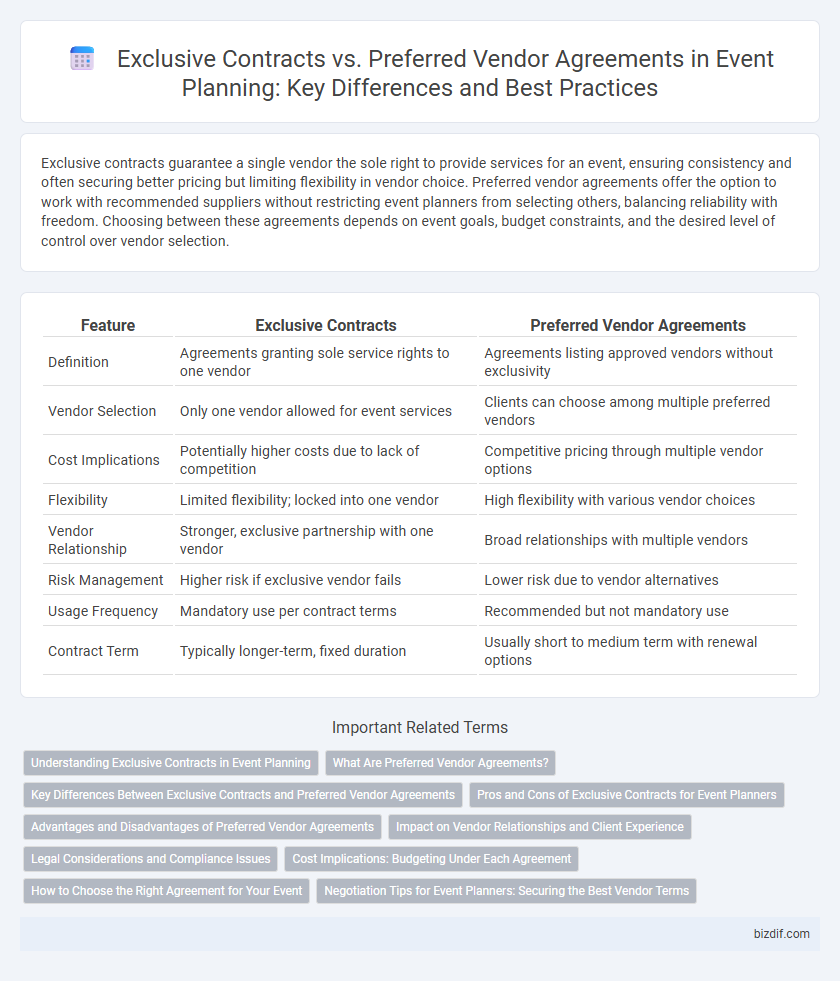Exclusive contracts guarantee a single vendor the sole right to provide services for an event, ensuring consistency and often securing better pricing but limiting flexibility in vendor choice. Preferred vendor agreements offer the option to work with recommended suppliers without restricting event planners from selecting others, balancing reliability with freedom. Choosing between these agreements depends on event goals, budget constraints, and the desired level of control over vendor selection.
Table of Comparison
| Feature | Exclusive Contracts | Preferred Vendor Agreements |
|---|---|---|
| Definition | Agreements granting sole service rights to one vendor | Agreements listing approved vendors without exclusivity |
| Vendor Selection | Only one vendor allowed for event services | Clients can choose among multiple preferred vendors |
| Cost Implications | Potentially higher costs due to lack of competition | Competitive pricing through multiple vendor options |
| Flexibility | Limited flexibility; locked into one vendor | High flexibility with various vendor choices |
| Vendor Relationship | Stronger, exclusive partnership with one vendor | Broad relationships with multiple vendors |
| Risk Management | Higher risk if exclusive vendor fails | Lower risk due to vendor alternatives |
| Usage Frequency | Mandatory use per contract terms | Recommended but not mandatory use |
| Contract Term | Typically longer-term, fixed duration | Usually short to medium term with renewal options |
Understanding Exclusive Contracts in Event Planning
Exclusive contracts in event planning grant a single vendor sole rights to provide specific services or products for an event, eliminating competition from other suppliers. These agreements ensure consistent quality and reliability but may limit flexibility and increase costs due to the lack of alternative options. Understanding the terms and scope of exclusivity is crucial for event planners to balance vendor commitment with budget and creative control.
What Are Preferred Vendor Agreements?
Preferred vendor agreements are contracts between event planners and suppliers that establish a mutually beneficial relationship without restricting the planner to a single vendor. These agreements outline negotiated rates, priority access, and service terms, aiming to streamline event logistics and ensure consistent quality. Preferred vendor agreements provide flexibility for planners while securing reliable partnerships that enhance event execution and cost management.
Key Differences Between Exclusive Contracts and Preferred Vendor Agreements
Exclusive contracts grant a single vendor sole rights to provide specific services for an event, ensuring no competitors participate. Preferred vendor agreements allow event planners to recommend certain vendors without restricting clients from choosing others, promoting flexibility. These key differences impact vendor selection control, negotiation leverage, and event diversity.
Pros and Cons of Exclusive Contracts for Event Planners
Exclusive contracts offer event planners guaranteed access to specific vendors, ensuring consistent quality and streamlined communication, which can enhance event execution efficiency. However, these contracts can limit flexibility, potentially increasing costs and reducing options if the exclusive vendor underperforms or lacks variety. Event planners must weigh the trade-off between reliability and adaptability when committing to exclusive agreements.
Advantages and Disadvantages of Preferred Vendor Agreements
Preferred vendor agreements streamline event planning by ensuring consistent quality and negotiated pricing, fostering long-term partnerships that simplify logistics and budgeting. However, these agreements may limit flexibility by restricting event planners to a select group of vendors, potentially missing out on innovative options or better deals elsewhere. Dependence on preferred vendors could also reduce competitive pressure, leading to complacency and less motivation for vendors to deliver exceptional service.
Impact on Vendor Relationships and Client Experience
Exclusive contracts often strengthen vendor loyalty and ensure consistent quality by limiting clients to a single provider, which can enhance seamless event execution but may reduce flexibility in vendor choices. Preferred vendor agreements promote a curated selection of trusted suppliers, fostering competitive pricing and diverse options while maintaining a reliable standard, ultimately benefiting client satisfaction through balanced vendor relationships. Both contract types influence client experience by shaping the level of vendor collaboration and the breadth of available event services.
Legal Considerations and Compliance Issues
Exclusive contracts require event planners to work solely with a selected vendor, often including strict non-compete clauses and penalties for breach, making thorough legal review essential to avoid liability. Preferred vendor agreements offer more flexibility, allowing collaboration with multiple suppliers but still demand compliance with state contract laws and clear terms regarding services, payment, and termination. Understanding these legal frameworks ensures enforceability, reduces the risk of disputes, and maintains regulatory compliance in event planning operations.
Cost Implications: Budgeting Under Each Agreement
Exclusive contracts often involve higher upfront costs due to the guaranteed commitment to a single vendor, which can limit competitive pricing and increase the overall event budget. Preferred vendor agreements typically offer more flexible pricing options, allowing event planners to compare rates and potentially negotiate discounts, leading to better cost control. Understanding the financial commitments and potential savings of each agreement type is crucial for accurate budgeting and maximizing event ROI.
How to Choose the Right Agreement for Your Event
Choosing between exclusive contracts and preferred vendor agreements depends on the event's scale, budget, and desired vendor flexibility. Exclusive contracts ensure dedicated attention and consistency from a single vendor, minimizing coordination challenges, while preferred vendor agreements offer broader options and competitive pricing through multiple vetted suppliers. Event planners must evaluate vendor reliability, cost-effectiveness, and contractual obligations aligned with their event objectives to select the most effective agreement type.
Negotiation Tips for Event Planners: Securing the Best Vendor Terms
Event planners should thoroughly evaluate the scope and exclusivity terms when negotiating exclusive contracts versus preferred vendor agreements to ensure maximum flexibility and value. Prioritizing clear deliverables, payment terms, and cancellation policies helps mitigate risks and fosters strong vendor relationships. Leveraging competitive bids and establishing performance benchmarks are key strategies to secure the best possible vendor terms.
Exclusive contracts vs Preferred vendor agreements Infographic

 bizdif.com
bizdif.com